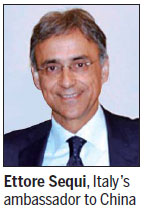Italy reforms to lure foreign cash

Measures to stabilize country's political and business environment
Italy is taking measures to stabilize its political and business environment, hoping to make it into a country where more Chinese state-owned and private companies would like to invest and do business.
Italy's ambassador to China, Ettore Sequi, spoke to China Daily ahead of the 45th anniversary of diplomatic relations between China and Italy on Nov 6.
"Italian Prime Minister Matteo Renzi has launched reforms. These are important ones, aiming to make Italy into a more efficient place, to improve the business environment and to make (foreign) investment easier," he says.
One of the most important reforms focuses on introducing a new electoral law that will lead to a more efficient public administration system to better combat corruption and other existing social problems, said the ambassador, adding that the new reforms will also simplify the necessary legal procedures for foreign investors.
Former Italian leader Silvio Berlusconi has been mired in corruption and tax scandals, and Italy has changed its prime minister three times since Berlusconi stepped down in 2011. Problems such as corruption and an insecure political environment have become barriers for investors from other countries, including China.

"Chinese companies look at investment opportunities in Italy. But a fair business environment, stable government and consistent investment policies are crucial for them," says a source familiar with international acquisitions at an investment bank.
"Chinese companies have accumulated considerable capital. While Italy has many world famous companies, it does not have enough money and that makes global purchases possible."
In recent years, Italy has become a hunting ground for Chinese companies wanting to go from being domestic industrial giants to leading global players.
In March, China's state-owned China National Chemical acquired Italy's Pirelli for 7.1 billion euros ($7.7 billion). Pirelli is a 143-year-old Italian company and also the world's fifth-largest tire-maker.
The purchase is one of the biggest acquisitions by a Chinese company in Europe, but it is only one of the purchases by Chinese investors in Italy, which is the eurozone's third-largest economy.
Chinese acquisitions in Italy have totaled 10 billion euros over the past five years, half of which were in 2014, according to a study published by KPMG before the Pirelli deal. Nearly one-third of foreign purchases in Italy last year were Chinese, the report said.
According to Italian newspaper La Repubblica, the Chinese have bought about 200 Italian businesses, not including the ones owned by Chinese living in Italy. China's central bank holds stakes in several Italian blue chip companies such as Fiat, Telecom Italia, Generali, and Eni.
Sequi says Italy welcomes Chinese companies to invest in the country and hopes that Italian companies can use the investment from the Chinese to increase production and innovation.
Italy is renowned for its expertise in industries including fashion design, automobile, aerospace and robotic technology. Cooperation in the fields of environmental protection, food safety, medicine and urbanization will also be the highlights for future China-Italy business exchanges, the ambassador says.
To encourage Chinese investment in Italian companies, the Italian publisher ClassEditori has set up an online portal - vendereaicinesi.it, meaning sell to the Chinese - that features classified ads directed at Chinese investors. The spectrum of the advertisements runs from real estate to consumer products to entire companies.
"Some Italian companies have leading technologies and enjoy great popularity around the world. These will fulfill the needs of Chinese companies that want to expand their businesses to the world market," says Jia Xiudong, a senior researcher at the China Institute of International Studies.
"But one should not forget that Chinese companies do not only bring money. Some of them also have cutting-edge technologies and will help to create local employment."
In 2008, the Chinese telecommunications company Huawei opened its only microwave research and development center outside China in Milan, and announced that it would increase the number of research staff members in Europe to 1,700 by 2017.
zhouwa@chinadaily.com.cn
(China Daily European Weekly 11/06/2015 page28)
Today's Top News
- Japan tempting fate if it interferes in the situation of Taiwan Strait
- Stable trade ties benefit China, US
- Experts advocate increasing scope of BRI to include soft power sectors
- New engine powers cargo drone expansion
- China to boost green industry cooperation
- Manufacturing PMI rises in November






























